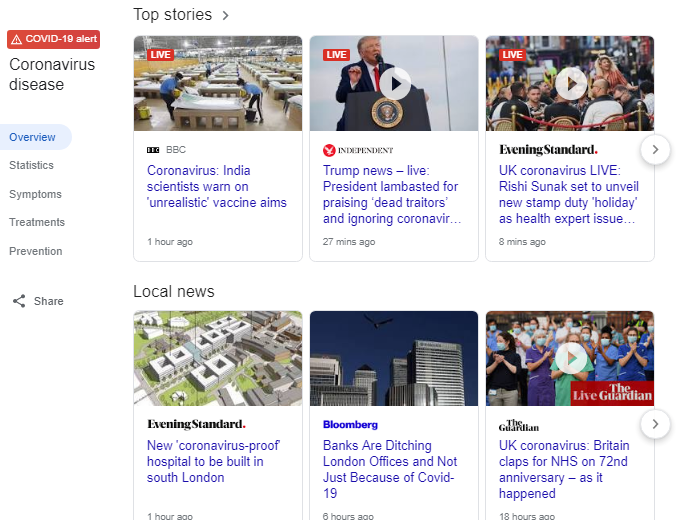
Google has insisted its algorithm is applied “universally” to all types of news organisations after Mail Online’s publisher complained its search visibility was consistently cut over six years.
The tech giant said its news algorithms are not designed to influence ranking depending on what a website’s point of view is on certain issues and that none of its systems aim to assess a publisher’s ideological or political leanings.
The tech giant said its search results will include stories taking differing positions on a topic as it defended its stance that it does not make editorial decisions in a letter to peers.
Google’s government affairs and public policy manager Tom Morrison-Bell gave evidence to the House of Lords’ inquiry into the future of journalism last month, but he was forced to write with further clarification after inquiry chairman Lord Gilbert said he was “disappointed” by the answers Morrison-Bell – and a representative from Facebook – had given.
Lord Gilbert pointed to claims from DMG Media in its submission to the inquiry that between 2013 and 2019 the platform “consistently cut” Mail Online’s search visibility until it stood at one-tenth of the Guardian’s.
This is despite a report from the Reuters Institute for the Study of Journalism that showed people spent three times as much time on Mail Online as the Guardian website during the December 2019 election period.
Mail and Metro publisher DMG Media has also complained that a Google algorithm update in June last year led to Mail Online’s daily traffic from Google falling by 50%.
In its response to Lord Gilbert, published today, Google said: “When Google ranks news content, no individual or set of individuals determines the ranking of any particular website.
“The algorithm is applied universally to the corpus of news pages online and ranks them accordingly.”
It also summarised some of the factors that determine how its algorithm ranks stories, including keyword relevance, how much prominence a publisher gives a particular story, authoritativeness on a subject, freshness of the information, and location and usability of the website.
Google disagreed with Lord Gilbert’s claim that it “refuses to pay publishers for the use of their content”.
It said: “In fact, in exchange for the limited use of short extracts of publisher content in Search and News, Google sends valuable referral traffic to publishers’ sites.
“The value of that traffic is substantial,” it said, pointing to Deloitte research finding that web-referral traffic is worth around €614m a year to UK news publishers.
And in an update on plans to pay selected publishers for “high-quality” content, Google said it will “shortly be starting discussions in the UK”. It revealed last month it was launching the new licensing programme with local and national publishers in Australia, Germany and Brazil.
Edward Bowles, Facebook’s director of public policy in Northern, Central and Eastern Europe, also responded to follow-up questions from Lord Gilbert who was unimpressed with his claim the platform has “no sense in which there is an imbalance of power” with publishers.
Bowles said: “Far from Facebook dictating terms, publishers can choose to use our platform how they see fit. They can direct people from reading a headline on Facebook to clicking to a full article on their own websites – this turns free readers into paying subscribers and helps their ad model.
“We approach all our work with news publishers from a collaborative point of view and feedback from publishers has consistently proved valuable in building them and our users a better experience, for example we increased the amount of ads the user can see in Instant Articles after publishers fed back it worked better for them from a monetisation point of view.”
Last week the Competition and Markets Authority called on the Government to create new powers to regulate the digital advertising market after Google and Facebook earned about 80% of the £14bn digital ad spend in the UK in 2019.
Email pged@pressgazette.co.uk to point out mistakes, provide story tips or send in a letter for publication on our "Letters Page" blog
